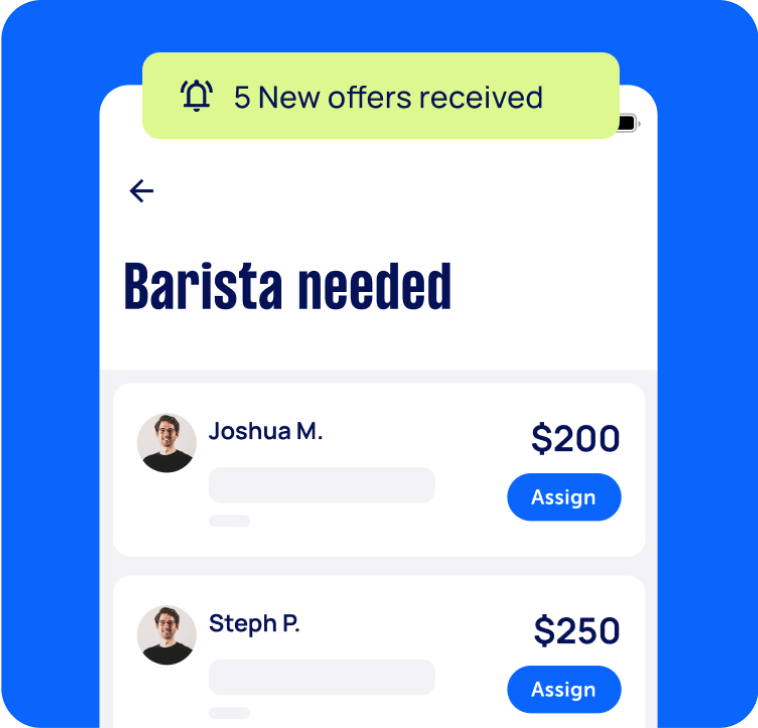

Find an experienced DBT therapist near you
Fill in a short form and get free quotes for professional DBT therapy sessions near you
Need dialectical behaviour therapy?
- Individual therapy
- Group skills training
- Phone crisis coaching
- Structuring the environment
- … or anything else
What is Airtasker?

Post your task
Tell us what you need, it's FREE to post.

Review offers
Get offers from trusted Taskers and view profiles.

Get it done
Choose the right person for your task and get it done.
Why book a DBT therapy service through Airtasker?
Professional help through dialectical behaviour therapy is at your fingertips through Airtasker. Our platform takes away the stress and hassle of endlessly searching for a DBT therapist who matches your goals and your needs.
A DBT therapist accepts you just the way you are and the issues or problems you have. At the same time, they acknowledge the necessity for change so you can recover, move forward, and reach your personal goals and aspirations. Your Tasker can walk with you as you move towards a life that you find fulfilling and meaningful.
Help is just a post away. Put up a task, and qualified Taskers nearby will approach you with their offers. Feel free to go through their profiles as you decide whose service you think can best assist your needs. You can compare their ratings and client reviews so you can rest assured that the DBT therapist you’re getting is the right one for you!
Stay insured
Take your pick of DBT Therapists near you.
Flexible pricing
Choose the offer that’s right for you.
Get the best taskers
Judge for yourself – every task gets a review.
Quick offers
Start getting offers to do your task ASAP!
Top DBT Therapy related questions
Cognitive behavioural therapy or CBT gives a primary focus on how your thoughts, feelings, and behaviours influence each other. It teaches you how to use this to your advantage by showing how a positive change in one of them can lead to positive changes in all the other factors. DBT, on the other hand, focuses on how to regulate these things, especially the extreme, unstable, and harmful thoughts, feelings, and behaviours.
DBT therapy can help a whole range of mental health conditions. For example, if you find yourself struggling to control your emotions and keep them in check, DBT can be one of the tools that can show you how. It can also be for people who are struggling with eating disorders and addictions or have experienced trauma. Feel free to consult with your Tasker first if DBT therapy is the type of therapy suitable for you.
The minimum requirement you should have when looking for a DBT therapist is their credentials. Ask if they have specialised training and experience in DBT. Your therapist should also know basic behaviour therapy techniques and treatment strategies. Most importantly, find a DBT therapist that you feel comfortable with. They should exhibit warmth, respect and empathy.
An entire DBT course takes around six months to complete. But it’s essential to keep in mind that there is no fixed timeline for DBT. The time it takes for DBT to be completed and work usually depends on the type of disorder DBT is treating and how severe it is. Its duration can also vary on your schedule and how much time you can commit to your DBT therapy.
Related Services near me
What do DBT therapy services include?
Dialectical behaviour therapy or DBT can equip you with new skills that can help you manage painful and intense emotions. Its goal is to assist you with understanding and accepting your difficult feelings and making positive changes in your life.
By focusing on mindfulness, distress tolerance, emotion regulation, and interpersonal effectiveness, your DBT therapist can teach you how to change and cope with unhealthy behaviours. Here’s what you can expect from DBT therapy near you:
Individual therapy
The goal of having individual therapy is to identify and assess unhealthy behaviours and the feelings and thoughts associated with them. Through this, your Tasker can help you keep safe by reducing behaviours that stand in the way of your treatment. Your Tasker can also teach you new skills to replace problematic behaviours and promote motivation to help you achieve your goals. They may ask you to track your emotions and actions and identify the patterns and triggers in your life. This information will be used to decide what you and your DBT therapist will work on in each session.
Group skills training
DBT therapy also involves interacting with others. Group skills training is not group therapy; it’s more like a classroom setting that teaches you skills you can apply from your day-to-day life. These skills include tolerating distress and negative emotions, regulating thoughts and feelings, being mindful and present in the given moment, and communicating and interacting effectively with others. This is typically done weekly and can involve role-playing and homework to help you absorb the learnings efficiently.
Phone crisis coaching
Sometimes, you would face situations that can be a struggle for you. For example, outside your therapy environment, you would likely deal with interpersonal relationships, work obligations, and other daily stressors. Phone coaching allows you to reach out to your DBT therapist in between sessions when you need help dealing with an immediate crisis, when you are trying to apply the DBT skills you’ve learned but want some tips on how to do it, or when you feel like you’re about to engage in problematic behaviour. Calling your Tasker during these times can help you develop effective responses to whatever your situation is.
Structuring the environment
DBT believes that the environment greatly affects human behaviour. To take care of your mental health and wellness, one of DBT’s functions is to structure the environment in a way that reinforces and encourages effective progress and discourages problematic behaviour. Your Tasker can also help you modify your environment, whether it’s avoiding certain social circles or making sure your partner or anyone who lives with you maintains a supportive and loving atmosphere. Having the people in your environment go through coaching can also be useful in structuring an environment that supports your positive behavioural change.